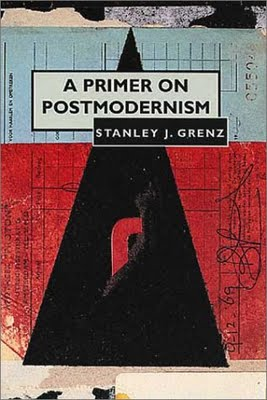by Sean D. Evans (Blogger)
Email: onlineeditor at ufvcascade dot ca
 If I ever have the pleasure of making your acquaintance, you will find that I tend to poke fun at postmodernism (all in good fun). I believe in objective truth. The sort of truth that makes it universally unacceptable to murder, cheat, tail-gate, and cheer for the Calgary Flames (or their farm team…).
If I ever have the pleasure of making your acquaintance, you will find that I tend to poke fun at postmodernism (all in good fun). I believe in objective truth. The sort of truth that makes it universally unacceptable to murder, cheat, tail-gate, and cheer for the Calgary Flames (or their farm team…).
The problem with this, I’ve found, is that some do not buy into this concept of objective truth.
Which is okay.
Wait. Does that make me postmodern? No. It could make me tolerant, whatever that means. Regardless, it certainly doesn’t make us both right. If you think it does, please don’t bother arguing against my position (according to you, my postmodern friend, I am right in my own ‘special’ way)
The thing is, I get annoyed when you (my postmodern peers), say things to me like: “Hey, don’t be a hater. What’s true for you is true for you, and what is true for me is true for me. Justin Beiber is a stud.”
I have a hard time understanding this. How is it that the only acceptable objective “truth” is that there is no objective truth. It seems to me like postmodernism has just shot itself in the foot, if anything.
Forgive me if I am over-simplifying the issue, but when a worldview cannot even withstand its own conditions, something has gone awry
Am I wrong?
Feel free to answer that, just don’t say I am wrong on account of everyone having their own ‘special’ truth.
Anyway, enough of my late-night ranting. Here is a thoughtful comment on the matter from Stanley J. Grenz in A Primer on Postmodernism (p 42-43)
Our globalized, pluralistic situation has subverted the Enlightenment vision. Postmoderns contend we can no longer reasonably hold out the prospect of discovering the one, universal symbolic world that unites humanity at a level deeper than that of our apparent differences. Indeed, they say, we must come to grips with the realization that we inhabit a globe consisting of “multiple realities.” Different groups of people construct different “stories” about the world they encounter. These different languages, in turn, facilitate different ways of experiencing life. As a result, people do not merely espouse different political opinions and religious beliefs; they actually live in different worlds with respect to basic matters of personal identity, time, and space.
Grenz brings it home by saying:
The postmodern understanding of knowledge, therefore, is built on two foundational assumptions: (1) postmoderns view all explanations of reality as constructions that are useful but not objectively true, and (2) postmoderns deny that we have the ability to step outside our constructions of reality.
Thoughts?


